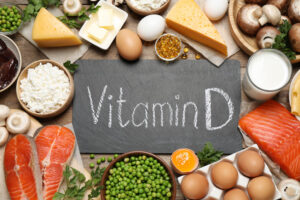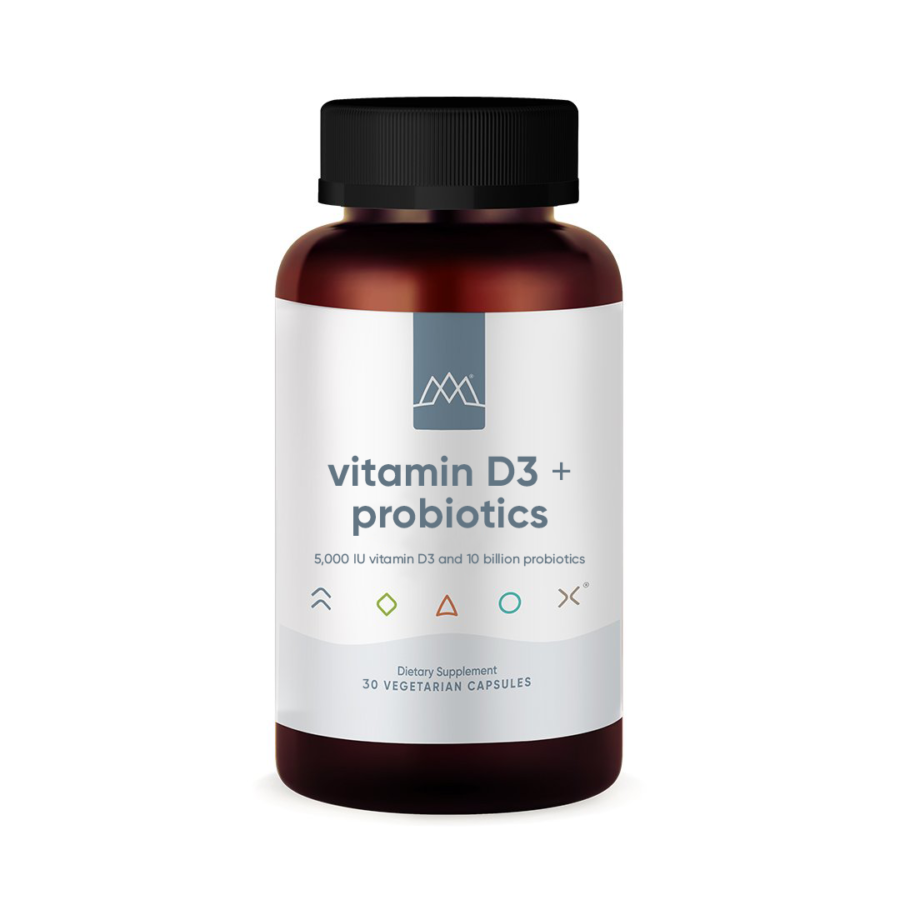Vitamin D is an important nutrient that is essential for a healthy body. It is found in the diet, made by your body after sun exposure, and found in many supplements and fortified products.(1) One of Vitamin D’s main roles is to assist your body in absorbing calcium, which helps prevent osteoporosis, a disease where the bones become weakened and more likely to break.(2) This is not vitamin D’s only role, though, as it is essential for other processes too, including muscle movement, brain signaling, and immune function.(3)
Where Do We Get Vitamin D?
 Unfortunately, vitamin D is not easy to get from diet alone, as few foods naturally contain vitamin D. There are some foods that are fortified with vitamin D in the United States, like milk, breakfast cereals, orange juice, and yogurt, however, many of the processed foods which may be fortified with vitamin D are not a part of the MaxLiving nutrition plans, including the Core Plan.(4) Some foods naturally contain vitamin D, like salmon, herring, sardines, cod liver oil, tuna, egg yolks, beef liver, and mushrooms, although none contain enough to reach your daily intake alone.(5)
Unfortunately, vitamin D is not easy to get from diet alone, as few foods naturally contain vitamin D. There are some foods that are fortified with vitamin D in the United States, like milk, breakfast cereals, orange juice, and yogurt, however, many of the processed foods which may be fortified with vitamin D are not a part of the MaxLiving nutrition plans, including the Core Plan.(4) Some foods naturally contain vitamin D, like salmon, herring, sardines, cod liver oil, tuna, egg yolks, beef liver, and mushrooms, although none contain enough to reach your daily intake alone.(5)
This is not too bad though, as the body is able to make its own vitamin D when your bare skin is exposed to direct sunlight.(6) Your skin has receptors for UVB rays from the sun, which when activated, allow the body to produce its own vitamin D. This is the way many people get their vitamin D, but is not always possible for everyone, because clouds, older age, and even darker skin can prevent you from getting the necessary amounts of UVB for vitamin D creation at sufficient levels, and many people simply aren’t outside often enough, for long enough.
Other individuals simply want to avoid exposing themselves to more UVB than needed because of its known association with sunburns and skin cancer.(7) When vitamin D isn’t absorbed through diet or created following sun exposure, supplementation is necessary to avoid having a vitamin D deficiency.
Vitamin D Supplements
Vitamin D is available as a supplement in 2 major forms that the body can use: vitamin D2 (ergocalciferol) and vitamin D3 (cholecalciferol).(8) While it has been shown that vitamin D2 can raise the amount of vitamin D in the body, vitamin D3 has been shown to do so for longer at higher levels, making it the preferred form for supplements containing vitamin D. This is why MaxLiving’s Vitamin D3 + Probiotics uses the D3 form. Vitamin D supplements, like MaxLiving’s Vitamin D3 + Probiotics, are best taken with a portion of healthy fat-rich food, as vitamin D is stored in fat.
How Do I Know if I’m Getting Enough Vitamin D?
The easiest way to know if you are getting enough vitamin D is to have your doctor perform a blood test to check your vitamin D blood levels.(9) This is because you get vitamin D from several different sources including diet, sunshine, and supplements, so measuring how much you take in can be difficult. The blood test looks for vitamin D in its most common form in the blood, 25-hydroxyvitamin D at the nanomoles per liter (nmol/L) or nanograms per milliliter (ng/mL) levels. Generally, there are 3 levels that the blood test will show:
- <30 nmol/L (12 ng/mL) – This level is often too low for adults and may cause weakened muscles, bones, or immune health
- ~50 nmol/L (20 ng/mL) – This level and a range slightly higher is healthy for most adults and will not cause health problems
- >125 nmol/L (50 ng/mL) – This level is too high, and may cause toxicity.
Certain groups have more difficulty getting enough vitamin D including breastfed infants, older adults, those who seldom expose bare skin outdoors in the sun, those with darker skin tones (which prevents the skin from absorbing as much UVB), those who have conditions that affect fat absorption, like Crohn’s disease, celiac disease or ulcerative colitis (vitamin D is absorbed with fat), and those who are obese or have had gastric bypass surgery.(10)
Vitamin D Deficiency
Vitamin D deficiency can have disastrous effects on the health of both children and adults. It has been known for a long time that vitamin D deficiency in children can cause a disease known as rickets, where the bones become painful, soft, weak, and deformed (often causing bow-leggedness).(11) In older children, teens, and adults, vitamin D deficiency causes calcium deficiency and a condition called osteomalacia, leading to weak bones, bone pain, and muscle weakness. This is not the only effect of vitamin D deficiency, though.(12)
 Doctors and researchers are now learning that vitamin D plays an important role in immune health, especially the body’s defense against viruses and bacteria.(13) Several studies have shown that taking vitamin D supplements at dosages of up to 4000 IU a day may even reduce your risk of respiratory tract infections, (including viral infections such as the common cold, the flu, or COVID-19).(14)
Doctors and researchers are now learning that vitamin D plays an important role in immune health, especially the body’s defense against viruses and bacteria.(13) Several studies have shown that taking vitamin D supplements at dosages of up to 4000 IU a day may even reduce your risk of respiratory tract infections, (including viral infections such as the common cold, the flu, or COVID-19).(14)
This means one sign that you may be deficient in vitamin D could be recurrent infections like repeat colds or the flu.(15) Other signs could include fatigue, bone or back pain, depressed mood, slow or incomplete wound healing, bone loss, hair loss, and muscle pain. The good news is that most of these symptoms can be resolved by adding a vitamin D supplement like MaxLiving’s Vitamin D3 + Probiotics. If are experiencing concerning symptoms or you think you may have vitamin D deficiency, talk to your doctor about adding a vitamin D supplement at a safe dosage.
Can I Have Too Much Vitamin D?
YES! It is possible to take too much vitamin D, highlighting the importance of taking a high-quality supplement at the appropriate dosage, like MaxLiving’s Vitamin D3 + Probiotics, which contains a highly absorbable form of vitamin D at a dosage safe for daily use. If your blood levels of vitamin D go above 375 nmol/L (or 150 ng/mL), you may feel nauseous, experience muscle weakness, confusion, pain, dehydration, excessive thirst, or even an irregular heartbeat and kidney stones. Ensure you always follow the directions of your doctor when taking supplements containing vitamin D in order to stay in the healthy range.
References:
- https://ods.od.nih.gov/factsheets/VitaminD-Consumer/
- https://www.osteoporosis.foundation/patients/prevention/vitamin-d
- https://ods.od.nih.gov/factsheets/VitaminD-Consumer/
- https://www.healthline.com/nutrition/9-foods-high-in-vitamin-d#7.-Fortified-foods
- https://www.healthline.com/nutrition/9-foods-high-in-vitamin-d
- https://www.yalemedicine.org/news/vitamin-d-myths-debunked
- https://www.cancer.org/cancer/cancer-causes/radiation-exposure/uv-radiation.html
- https://www.ncbi.nlm.nih.gov/books/NBK56061/#:~:text=The%20two%20major%20forms%20are,intake%20of%20animal%2Dbased%20foods.
- https://medlineplus.gov/lab-tests/vitamin-d-test/
- https://ods.od.nih.gov/factsheets/VitaminD-Consumer/
- https://medlineplus.gov/vitaminddeficiency.html
- https://www.healthline.com/nutrition/vitamin-d-deficiency-symptoms
- https://www.ncbi.nlm.nih.gov/pmc/articles/PMC7281985/
- https://www.ncbi.nlm.nih.gov/pmc/articles/PMC7397989
- https://www.ncbi.nlm.nih.gov/pmc/articles/PMC7551809/
About the Author

Jini Cicero is a Los Angeles-based Strength and Conditioning Specialist with a bachelor’s degree in Kinesiology. With over 20 years experience as a health, fitness, and nutraceutical professional, Jini is passionate about advancing natural medicine and optimal health. Whether she’s working with Hollywood celebrities or cancer patients, Jini uniquely combines exercise science, sports nutrition, and corrective exercise. As a speaker, presenter, and writer, her work has been featured in numerous publications, such as Shape, MindBodyGreen, and The L.A. Daily News.




